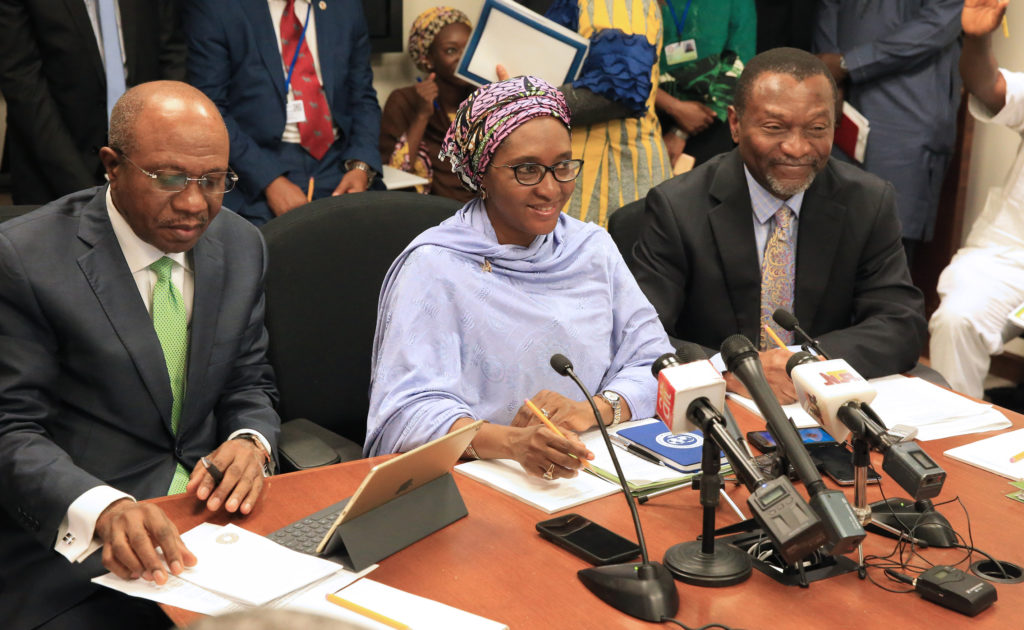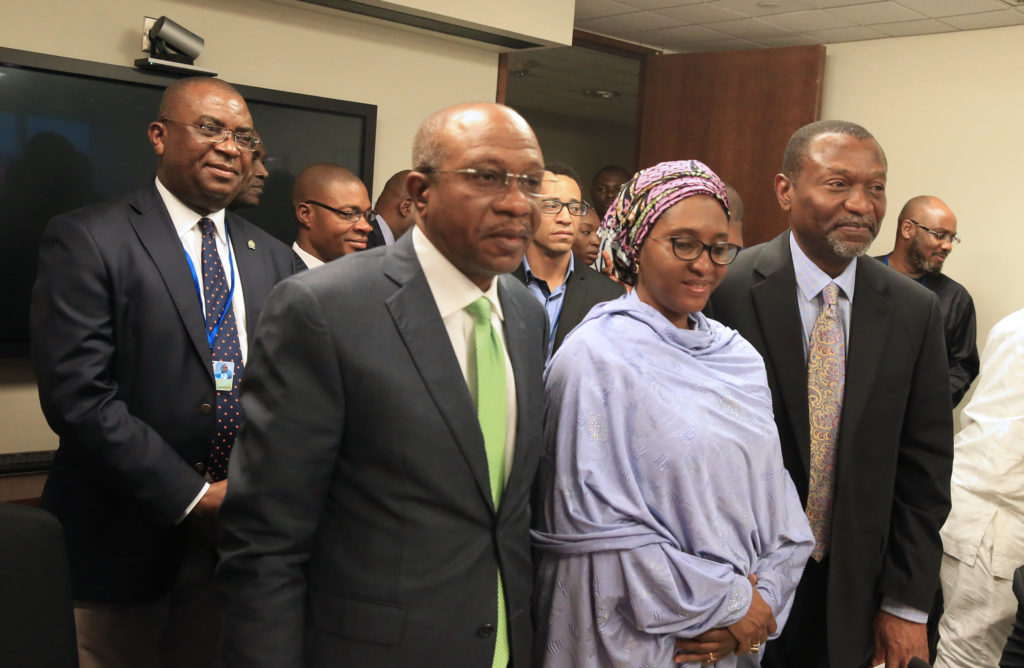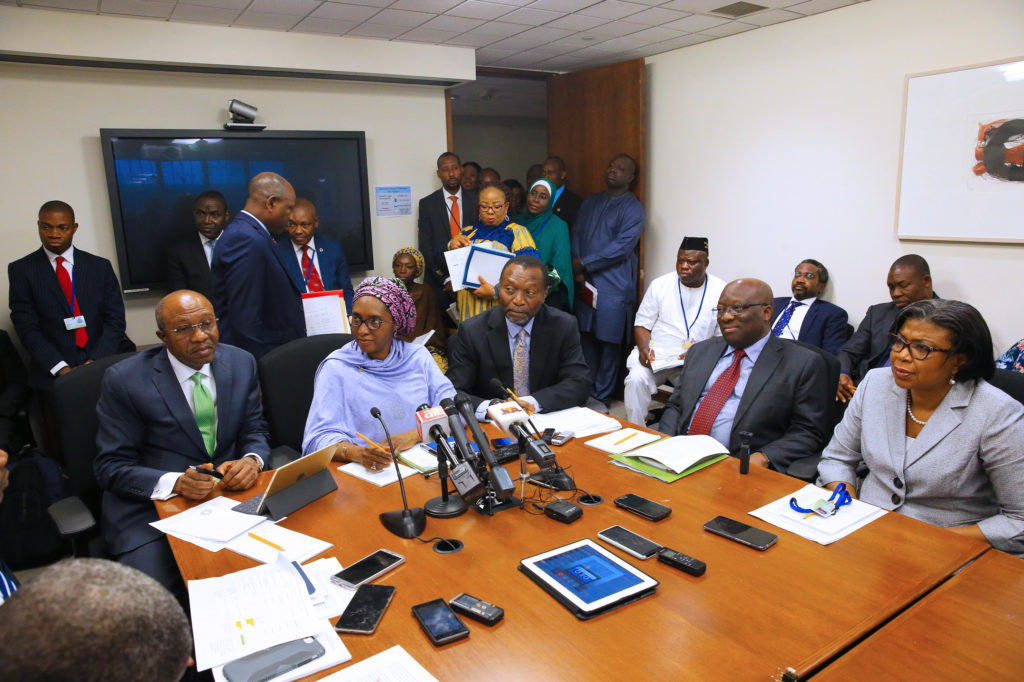…as Udoma lobbies IFC on funding critical infrastructure
By Ebriku John Friday
The Minister of Finance, Zainab Shamsuna Ahmed, Sunday, at the just concluded 2019 Spring Meetings of the World Bank Group (WBG), and International Monetary Fund (IMF), in Washington DC, United States of America, USA, disclosed that the Federal Government is set to issue a second N15 billion Green Bond to finance agriculture, power, health and water resources sectors of the economy before end of 2019.
This was made known by the Minister in a statement signed by the Special Adviser to the Minister of Finance on Media and Communications, Mr Paul Ella Abechi, during a media briefing.
According to her while speaking on climate issues said following Nigeria’s endorsement of the Coalition Principles as one of the funding members it became the first SSA country to issue a green bond in December (N10.97 billion) for the financing of solar.
She said: “In view of our efforts as Finance ministers who play a key role in steering the economy and managing risks, including from climate change, climate finance, we were invited to join the coalition of climate Finance Ministers a coalition of Finance Ministers with long experience with climate actions and are well aligned with the Principles of the Coalition.
“Nigeria endorsed the Coalition Principles as one of the founding members. Recall, we were the first SSA country to issue a green bond in December (N10.97 billion) for the financing of solar and we are currently in the process of issuing a second green bond N15 billion later this year to finance various sectors in agriculture, power, health and water resources.”
On bilateral issues she explained that, “We also had some bilateral meetings. The delegation met with the Director, Africa Department of IMF where we updated the Fund on not only developments in the Nigerian economy but also our commitment to fully implement the EGRP.
“The IMF also promised to assist us in the area of liquidity management and share lessons and experiences on countries where the energy subsidies were successfully managed.”
The minister in her address highlighted government’s effort on human capital development following earlier concerns raised on the position Nigeria had as 157 out of 189 globally, which was worrisome.
“You will recall that at the Bali meetings when the Human capital project was released, many of us were concerned that Nigeria was placed 157 out of 189 and I did promise that we would go back home and address this issue, I am happy to report that we used this Spring meetings to show case what the government is doing in this important area.
“We have set up an inter-ministerial working group with representatives of the State Governors and are currently piloting some initiatives in health, education and of course you are all aware of the social safety nets programs of the Federal Government where we have 15 million people already on the register. The WBG was pleased with our efforts and promised to offer some assistance”, she said.
She further stated that the Nigerian delegation at the Spring Meetings also met with the World Bank Power Sector team and discussed the way forward on the Proposed $1 billion Nigeria Performance Based Loan (PBL).
“We agreed to bring relevant MDAs together to ensure that we advance this operation in a timely manner. We will also discuss the Country Portfolio Performance of Nigeria which currently stands at to $9.8 billion with the Nigerian Country team at the World Bank and how we could manage the portfolio for optimum results”, she explained.
According to her at a meeting with the US treasury at the President Emergency Plan Aids Relief (PEPFAR) round-table where they discussed developments with respect to HIV financing, which she said, “I spoke about the HlV-specific government measures and interventions, and our initiative on the Basic Healthcare Provision Fund (BHCPF) to ensure the most efficient ways of utilizing health resources.
“The Fund ensures that one per cent of the Consolidated Revenue Fund, CRF, along with contributions from donor grants, is set aside to fund the basic health care needs of Nigerians, with focus on primary health care and called for assistance in the area of generation and management of data.”
She further told the media that during her participation in the Governors Consultative Council (GCC) meeting of the African Development Bank wherein they continued the discussion of the proposal for a seventh General Capital Increase (GCl-Vll) which started in December 2018 in Rome, Italy.
Speaking on the outcome of this crucial meeting she said, “Governors discussed a number of strategic questions around the comparative advantage of the AfDB Group within Africa’s Development landscape, its strategic focus, complementarily between the ADB and the ADF and its medium term plans to strengthen its delivery capacity.
“Governors also discussed the financial scenarios and measures to ensure financial sustainability. Governors examined what a capital increase look like for the ADB and for Africa and agreed that discussion should continue. We expect to finalise in October 2019.”
Meanwhile, in a related development, one of the Nigerian delegates to the Spring Meetings, the Minister of Budget and National Planning, Senator Udoma Udo Udoma, during the media briefing on outcomes of meetings attended also spoke on efforts made to lobby the International Finance Corporation (IFC) to fund critical infrastructure in Nigeria and other issues of national importance.
“In the course of my meeting with officials of the International Finance Corporation (IFC), I asked for their support for our efforts to leverage private sector capital to fund critical infrastructure in Nigeria. As you know, Nigeria requires private sector capital to bridge the country’s infrastructure gap – which is critical to achieving the objectives of the ERGP.
“At the State of the African Region, discussions centred on the role of regional cooperation in tackling fragility in Africa. A major takeaway was the need to pay attention to women empowerment and education of the girl child as these have positive implications in dealing with fragility and reducing conflicts. As you know, investing in our people and the issue of girl-child education are some of the objectives of the ERGP”, Udoma added.




